INVEST IN CRYPTO : Investing in cryptocurrency offers significant opportunities but comes with notable risks that should be carefully considered. The market is highly volatile, with prices capable of swinging dramatically within short periods, which means substantial potential for both gains and losses. Cryptocurrencies, such as Bitcoin and Ethereum, are built on blockchain technology, offering decentralized financial systems, but not all cryptos have the same level of stability or potential. It’s essential to thoroughly research any project before investing, considering factors like technology, use case, and market sentiment.
Diversifying your portfolio can help reduce risks, as putting all funds into a single asset increases exposure to market fluctuations. Additionally, due to regulatory uncertainty in many regions, it’s crucial to stay informed about legal implications and tax obligations related to crypto investments. Security is another critical aspect—using reputable exchanges and safeguarding assets in secure wallets can prevent loss through hacks. Ultimately, whether taking a long-term hold strategy or engaging in short-term trading, having a clear risk management plan is key to navigating the crypto landscape effectively.
What are those five apps?
When investing in cryptocurrency, the right app can make a big difference in terms of security, ease of use, fees, and available features.
1. Coinbase
Best for Beginners
- Overview: Coinbase is one of the most popular and beginner-friendly cryptocurrency apps. It allows users to buy, sell, and store a variety of digital currencies, and its simple interface is a major selling point.
- Supported Coins: Over 50 coins, including major ones like Bitcoin (BTC), Ethereum (ETH), and Litecoin (LTC).
- Security Features: Coinbase offers two-factor authentication (2FA), secure cold storage for digital assets, and insurance coverage for funds stored in their custodial wallets.
- Fees: Coinbase’s fees can be higher than some other platforms, with a spread fee of around 0.5% for buying or selling crypto. There are also additional fees based on payment method and transaction amount.
- Unique Features:
- Coinbase Earn: Learn about cryptocurrency and earn free crypto as rewards.
- Coinbase Pro: For more advanced traders, offering lower fees and more tools for technical analysis.
- Mobile App: A smooth, intuitive app for managing crypto investments on-the-go.
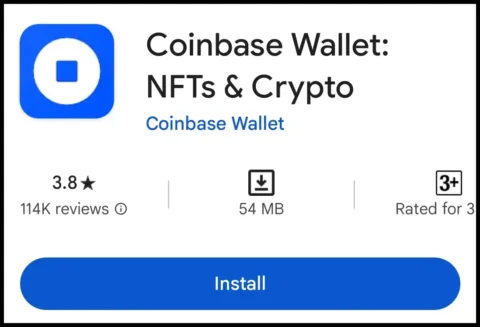
2. Binance
Best for Advanced Traders
- Overview: Binance is one of the largest and most diverse cryptocurrency exchanges globally. It’s known for a broad range of cryptocurrencies, advanced trading options, and low fees.
- Supported Coins: Over 350 cryptocurrencies, including Bitcoin, Ethereum, Binance Coin (BNB), and altcoins.
- Security Features: Binance employs advanced security measures, such as cold storage, 2FA, anti-phishing codes, and an insurance fund to protect user funds.
- Fees: Binance offers one of the lowest fee structures in the industry—0.1% for regular transactions. Fees can be further reduced by using Binance’s native coin (BNB) to pay fees.
- Unique Features:
- Binance Futures and Margin Trading: Allows for more advanced trading strategies with leverage.
- Staking: Users can earn passive income by staking certain cryptocurrencies.
- Binance Launchpad: Access to new token sales and initial coin offerings (ICOs).
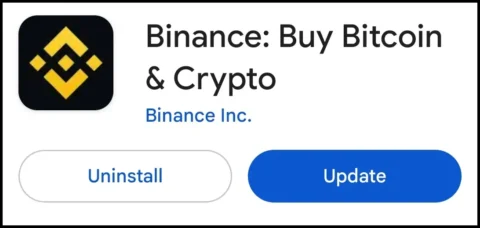
3. Kraken
Best for Security and Compliance
- Overview: Kraken is known for its strong security features and regulatory compliance, making it a reliable option for both beginners and experienced traders.
- Supported Coins: Over 70 cryptocurrencies, including Bitcoin, Ethereum, XRP, Polkadot (DOT), and more.
- Security Features: Kraken uses bank-grade security features, including 2FA, PGP encryption, and cold storage. It is also regulated in several countries, providing an additional layer of trust.
- Fees: Kraken has a fee structure starting at 0.16% for makers and 0.26% for takers. Their fees are relatively low for large trades.
- Unique Features:
- Futures and Margin Trading: Kraken offers advanced trading options, including futures and margin trading.
- Kraken Earn: Allows users to earn rewards by staking certain cryptocurrencies.
- Educational Resources: Kraken provides various learning materials for traders, from beginners to advanced users.
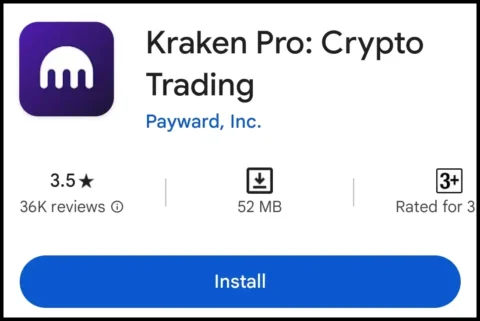
4. eToro
Best for Social and Copy Trading
- Overview: eToro is a social trading platform that lets users copy the trades of successful investors. It is suitable for both beginners and more experienced traders who want to take advantage of social trading.
- Supported Coins: More than 30 cryptocurrencies, including Bitcoin, Ethereum, Cardano (ADA), and others.
- Security Features: eToro uses 2FA, encryption, and is regulated in several countries, including the U.S. (FINRA-registered).
- Fees: eToro charges a spread fee of around 1% for cryptocurrency transactions. The fees may vary based on the country and payment method used.
- Unique Features:
- CopyTrading: Users can automatically copy the trades of experienced traders, making it easier for beginners to invest.
- Social Trading Network: Engage with other investors, follow their strategies, and get insights into the crypto market.
- Wide Range of Assets: eToro supports not only cryptocurrencies but also stocks, commodities, and other financial instruments.
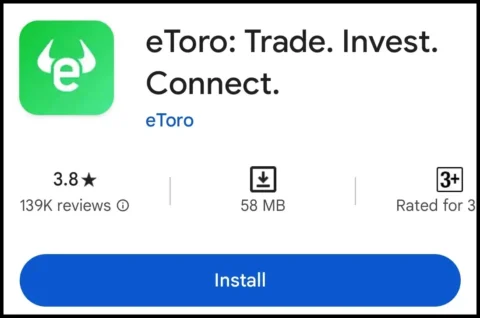
5. Gemini
Best for U.S. Investors and Compliance
- Overview: Gemini is a fully regulated cryptocurrency exchange based in the U.S., offering a secure and easy-to-use platform for buying, selling, and storing digital assets.
- Supported Coins: Over 50 cryptocurrencies, including Bitcoin, Ethereum, Litecoin, and stablecoins like USD Coin (USDC).
- Security Features: Gemini is known for its top-tier security, offering 2FA, insurance for crypto in cold storage, and strong regulatory compliance.
- Fees: Gemini charges 1.49% for basic transactions, but fees can be lower if you use Gemini ActiveTrader (a platform for advanced users).
- Unique Features:
- Gemini Earn: Offers interest on cryptocurrency holdings, similar to a savings account.
- Gemini Credit Card: Get crypto rewards with every purchase made via the Gemini Mastercard.
- Regulated in the U.S.: Gemini is regulated by the NYDFS (New York Department of Financial Services), making it a trustworthy option for U.S. investors.
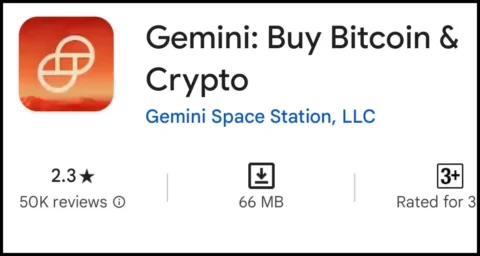
Comparison Summary:
| App | Best For | Supported Coins | Fees | Unique Features |
|---|---|---|---|---|
| Coinbase | Beginners | 50+ Cryptos | 0.5% spread, additional fees | Simple interface, Coinbase Earn, Pro version |
| Binance | Advanced Traders | 350+ Cryptos | 0.1% per trade, lower with BNB | Low fees, Futures/Margin trading, Staking |
| Kraken | Security and Compliance | 70+ Cryptos | 0.16% – 0.26% per trade | Futures/ Margin, Kraken Earn, Education |
| eToro | Social and Copy Trading | 30+ Cryptos | 1% spread | CopyTrading, social network, wide assets |
| Gemini | U.S. Investors | 50+ Cryptos | 1.49% standard, lower with ActiveTrader | Earn interest, regulated, Gemini Card |
Conclusion:
- Coinbase is perfect ease of use.
- Binance is great for experienced users looking for low fees and advanced features.
- Kraken excels in security and regulatory compliance, ideal for safety-conscious investors.
- eToro stands out for social trading and the ability to copy others’ trades.
- Gemini is a great option for U.S.-based investors who value regulatory oversight and want to earn passive income through interest.
Choose the platform that aligns best with your experience level, investment goals, and preferred features.
What are the benefits of trading with these apps?
Each of the major cryptocurrency platforms—Kraken, Binance, Coinbase, eToro, and Gemini—has its own set of advantages depending on what you’re looking for in terms of security, fees, features, and user experience. Here’s a breakdown of the benefits of trading with each:
1. Kraken
Benefits:
- Security: Kraken is known for its robust security measures, including cold storage for the majority of funds, two-factor authentication (2FA), and advanced encryption methods.
- Regulated & Compliant: Kraken is regulated in multiple jurisdictions, particularly in the U.S. This ensures that the platform follows strict legal standards, offering traders peace of mind regarding the safety of their investments.
- Advanced Features: Kraken offers a range of advanced trading options like margin trading, futures trading, and staking, which cater to both beginner and experienced traders.
- Low Fees for High Volume: While Kraken’s fees are typically around 0.26% for takers and 0.16% for makers, they decrease with higher trading volume, which is beneficial for frequent traders.
- Comprehensive Education: Kraken provides extensive educational resources, making it easier for both new and experienced users to navigate the crypto market.
2. Binance
Benefits:
- Low Fees: Binance is known for offering some of the lowest fees in the industry (starting at 0.1% per trade). You can further reduce fees by using Binance Coin (BNB) to pay for trading fees.
- Wide Range of Cryptos: Binance supports over 350 cryptocurrencies, including major coins like Bitcoin (BTC) and Ethereum (ETH), as well as lesser-known altcoins, providing a diverse selection for investors.
- Advanced Trading Tools: Binance offers a variety of trading options such as spot trading, margin trading, futures trading, and staking, making it suitable for both beginner and advanced traders.
- Staking and Earning: Users can stake certain cryptocurrencies to earn passive income and participate in Binance’s Launchpad, gaining early access to new token sales (ICOs).
- Liquidity and Market Depth: Binance is one of the largest cryptocurrency exchanges globally, offering deep liquidity and fast transaction times, which is beneficial for traders looking to execute large orders quickly.
3. Coinbase
Benefits:
- User-Friendly Interface: Coinbase is one of the most beginner-friendly platforms. It offers an intuitive interface that makes it easy to buy, sell, and store cryptocurrencies, especially for those new to the space.
- Reputation and Trust: As one of the largest and most well-known exchanges, Coinbase has built a solid reputation for reliability and transparency, which appeals to beginners.
- Educational Resources: Coinbase offers its users the ability to learn about cryptocurrency through its Coinbase Earn program, which rewards users with crypto for learning about different digital assets.
- Security: Coinbase provides robust security measures such as 2FA, insurance for assets stored in cold storage, and regulatory compliance to ensure user funds are well-protected.
- Coinbase Pro: For more experienced traders, Coinbase Pro offers lower fees, advanced charting tools, and professional-level trading features like limit orders, making it ideal for active traders.
4. eToro
Benefits:
- Social and Copy Trading: eToro’s standout feature is its social trading network, where users can follow and copy the trades of other investors.
- Wide Range of Assets: eToro supports a variety of assets, not just cryptocurrencies but also stocks, commodities, and ETFs, allowing users to diversify their portfolio.
- Regulated Platform: eToro is regulated in several countries, making it a trusted and secure platform for traders. In the U.S., it’s registered with the Financial Industry Regulatory Authority (FINRA).
- Ease of Use: The platform is designed with simplicity in mind, making it easy for beginners to start trading without feeling overwhelmed.
- Free Demo Account: eToro offers a demo account feature where users can practice trading with virtual funds before using real money.
5. Gemini
Benefits:
- Regulated & Secure: Gemini is one of the most regulated cryptocurrency exchanges, especially in the U.S. It is fully compliant with regulations, which provides a high level of trust and security for users. It also offers insurance for assets stored in cold storage.
- User-Friendly Interface: Like Coinbase, Gemini provides an easy-to-navigate platform that’s perfect for new users who want to buy and sell crypto without complex features.
- Earn Interest: Gemini offers the Gemini Earn feature, which allows users to earn interest on certain cryptocurrencies, similar to earning interest in a savings account.
- Wide Range of Cryptos: Gemini supports a wide variety of cryptocurrencies and stablecoins, including Bitcoin, Ethereum, and USD Coin (USDC).
- Professional Features: For active traders, Gemini ActiveTrader offers a more advanced trading platform with reduced fees and access to more sophisticated features, such as real-time market data, technical analysis tools, and charting.
Summary of Key Benefits:
| Platform | Best For | Key Benefits |
|---|---|---|
| Kraken | Security & Advanced Users | Top-tier security, regulatory compliance, margin & futures trading, staking, low fees for high volume traders. |
| Binance | Low Fees & Advanced Trading | Low trading fees, extensive crypto selection, margin/futures trading, staking, and passive income options. |
| Coinbase | Beginners & Simplicity | User-friendly, highly trusted, educational resources, Coinbase Pro for advanced trading. |
| eToro | Social Trading & Multi-Asset | CopyTrading feature, social trading network, regulated platform, multi-asset investing. |
| Gemini | U.S. Investors & Regulation | Fully regulated, security-focused, Gemini Earn for interest on crypto holdings, Gemini ActiveTrader for advanced traders. |
Each platform has unique benefits, and your choice will depend on your experience level, investment goals, and preference for specific features.
What are the disadvantages of trading with these five apps?
While Kraken, Binance, Coinbase, eToro, and Gemini offer a range of benefits for crypto traders, there are also certain disadvantages associated with each platform. Here’s a breakdown of the potential drawbacks for each:
1. Kraken
Disadvantages:
- Complex Interface for Beginners: Kraken offers advanced trading features, which may be overwhelming for beginners. The user interface isn’t as intuitive as some other platforms, which could be a barrier for new users.
- High Fees for Small Trades: While Kraken’s fees are competitive for large-volume traders, they can be relatively high for small trades, with fees starting at 0.26% for takers. This can be costly for users who trade infrequently or in smaller amounts.
- Limited Payment Methods: Kraken does not support direct INR (Indian Rupee) deposits, and for users in some regions, there are limited payment options. Bank transfers or using USD stablecoins might be necessary, which can complicate the process for some users.
- Customer Support: Kraken has had some complaints about customer support, particularly in times of high demand. Response times can be slow, and users may face challenges in getting issues resolved quickly.
2. Binance
Disadvantages:
- Regulatory Scrutiny: Binance has faced significant regulatory challenges in several countries, including India, the U.S., and the UK. This has led to restrictions in certain regions, and the platform has had to alter its offerings (such as limiting some services) in certain countries.
- Complexity for New Users: While Binance is an excellent platform for experienced traders, its interface can be daunting for beginners. It offers many features (spot trading, futures, staking, etc.), which may overwhelm new users.
- Customer Support Issues: Binance has been criticized for its customer support, especially regarding slow response times and difficult-to-reach service agents. This can be a significant problem if you encounter issues with your account or transactions.
- Security Concerns: While Binance has robust security features, it has been hacked in the past (in 2019, for example), and this raises concerns about the potential risk of funds being compromised in the future, especially for casual traders.
3. Coinbase
Disadvantages:
- High Fees: Coinbase’s fees are generally higher compared to many other platforms, especially for small transactions. The platform charges a spread fee of 0.5% on each transaction, and additional fees are applied depending on payment method and location.
- Limited Cryptocurrency Selection: While Coinbase offers many major cryptocurrencies, its selection is more limited compared to other platforms like Binance. If you’re looking to trade smaller or more obscure altcoins, you may be disappointed.
- Limited Advanced Features: While Coinbase has Coinbase Pro for more advanced traders, the regular Coinbase platform lacks some of the advanced features (such as advanced charting tools or margin trading) that more experienced traders might want.
- Regulatory Risks: Coinbase has been under scrutiny by regulators, particularly in the U.S., for potential violations related to unregistered securities. This could affect its operations in some regions and impact users if regulatory pressure increases.
4. eToro
Disadvantages:
- Limited Cryptocurrency Selection: eToro offers a smaller selection of cryptocurrencies compared to other platforms like Binance or Kraken. While it covers the most popular coins, it may not have access to some niche or newer cryptocurrencies.
- High Spreads: eToro charges high spreads (the difference between the buying and selling prices), which can be costly for traders, particularly for short-term trading.
- Limited Control Over Crypto Assets: eToro doesn’t allow users to withdraw crypto assets from the platform to their private wallets (unless they move to eToro’s Crypto Wallet), which means you don’t have full control over your digital assets.
- Complexity in Fees: eToro’s fee structure can be somewhat confusing due to its use of spreads and withdrawal fees. The costs can add up quickly, especially for small traders or those making frequent transactions.
- Limited Advanced Trading Features: eToro’s focus is on social trading, and while that’s beneficial for beginners, it may lack some of the advanced charting and trading tools that experienced traders desire.
5. Gemini
Disadvantages:
- High Fees: Gemini has relatively high fees compared to some other platforms. The standard fees for buying and selling are up to 1.49%, which can be expensive for frequent traders or those making small trades.
- Limited Payment Options: Gemini doesn’t support INR (Indian Rupee) deposits, so Indian traders may find it more difficult to fund their accounts directly. You may need to use USDT or other stablecoins or find workarounds like bank transfers in USD or EUR.
- Limited Cryptocurrency Selection: Gemini offers fewer cryptocurrencies than platforms like Binance or Kraken. If you’re looking to trade a wide variety of altcoins, Gemini’s selection might be restrictive.
- Less Advanced Trading Tools: Although Gemini does provide Gemini ActiveTrader for more advanced users, the platform’s default interface can feel less equipped with the advanced charting and trading tools that some professionals might want.
- Withdrawal Fees: Gemini imposes withdrawal fees for certain assets, which could make it expensive to transfer your crypto out of the exchange to an external wallet.
Summary of Disadvantages:
| Platform | Disadvantages |
|---|---|
| Kraken | Complex interface for beginners, high fees for small trades, limited payment methods, slow customer support. |
| Binance | Regulatory scrutiny in multiple countries, complex interface for beginners, customer support issues, past security breaches. |
| Coinbase | High fees, limited cryptocurrency selection, limited advanced features, potential regulatory risks. |
| eToro | Limited cryptocurrency selection, high spreads, limited control over crypto assets, complex fee structure, limited advanced features. |
| Gemini | High fees, limited payment options for Indian users, fewer cryptocurrencies available, less advanced trading tools, withdrawal fees. |
Can you do trading in India with these five apps?
Yes, you can trade cryptocurrencies with Kraken, Binance, Coinbase, eToro, and Gemini in India, but there are some important details to be aware of for each platform:
1. Kraken
- Availability in India: Yes, Kraken is available for Indian users, and you can trade various cryptocurrencies on the platform.
- Payment Methods: Kraken does not support direct INR (Indian Rupee) deposits or withdrawals. Indian users generally need to use USDT (Tether) or other stablecoins, or fund their accounts via bank transfers in USD or EUR.
- Regulations: While Kraken operates globally and follows regulatory standards in multiple countries, Indian regulations regarding cryptocurrencies are still evolving. Kraken remains operational in India, but you should keep an eye on local regulatory updates.
2. Binance
- Availability in India: Yes, Binance is accessible to Indian users, and it is one of the largest platforms for crypto trading in India.
- Payment Methods: Binance allows Indian users to deposit funds through UPI (Unified Payments Interface), P2P (peer-to-peer) trading, and bank transfers in INR. Binance also supports INR withdrawals.
- Regulations: Binance has had some regulatory scrutiny in India, especially regarding the government’s evolving stance on cryptocurrencies. However, it still remains a popular platform for Indian traders, and you can continue to use it as long as it remains operational in the country.
3. Coinbase
- Availability in India: Yes, Coinbase is available to Indian residents, and you can use it to buy, sell, and store cryptocurrencies.
- Payment Methods: Coinbase doesn’t directly support INR deposits, but you can fund your account using USD or EUR via wire transfers, or by using credit/debit cards (though this may involve extra fees).
- Regulations: Coinbase is a fully regulated platform and operates in several countries. In India, it works under the general crypto investment framework, though Indian regulations are still ambiguous, so it’s advisable to stay informed about any new developments.
4. eToro
- Availability in India: Yes, eToro is available in India for trading cryptocurrencies as well as stocks, commodities, and other assets.
- Payment Methods: eToro supports a variety of funding methods, including bank transfers and credit/debit cards. However, Indian users might not have direct access to INR deposits and will likely need to use USD or other currencies.
- Regulations: eToro operates under the regulations of various countries, including the EU, UK, and US. In India, the regulatory situation regarding cryptocurrency trading is still evolving, but eToro remains accessible to Indian traders.
5. Gemini
- Availability in India: Yes, Gemini is accessible in India. It allows you to trade popular cryptocurrencies and store them securely on the platform.
- Payment Methods: Like Coinbase, Gemini does not directly support INR deposits. Indian users need to use USDT or other stablecoins to deposit funds, or use bank transfers in USD, EUR, or other currencies.
- Regulations: Gemini operates globally and complies with U.S. regulations, so Indian users can continue trading. However, India’s regulatory framework on crypto is still evolving, so keep an eye out for updates.
Key Considerations for Indian Traders:
- Regulatory Uncertainty: India has not yet fully regulated cryptocurrencies, which makes it important to stay informed. As of now, there is no official ban on cryptocurrency trading in India, but the government has discussed various forms of taxation and regulation.
- Payment Methods: For most global platforms (like Kraken, Coinbase, and Gemini), Indian users typically rely on stablecoins (such as USDT) or use peer-to-peer (P2P) exchanges to fund their accounts. Direct INR support for deposits and withdrawals is still limited on some platforms.
- Taxation: The Indian government has proposed taxes on crypto transactions, and the tax regime is evolving. Indian traders should be aware of potential tax liabilities and report their gains and losses accurately.
- Regulatory Risk: Although trading on these platforms is generally available in India, there is ongoing legal uncertainty. The Indian government is contemplating stricter regulations on cryptocurrencies, and traders need to be prepared for any potential changes in the law.
Conclusion:
You can trade cryptocurrencies on Kraken, Binance, Coinbase, eToro, and Gemini in India, but each platform may have limitations in terms of payment methods and INR support. Additionally, while trading is still allowed, it is important to stay updated on Indian regulatory developments concerning cryptocurrencies to ensure that you comply with any new laws or taxes that may emerge.
How to invest in crypto with these five apps
Investing in cryptocurrency on platforms like Kraken, Binance, Coinbase, eToro, and Gemini is relatively straightforward. Below are the steps for each platform to guide you through the process of buying and trading crypto:
1. Kraken
Steps to Invest:
- Create an Account:
Go tob website. You’ll need to provide your email, set up a password, and verify your identity (KYC) with personal details and documents. - Deposit Funds:
After setting up your account, you can fund it with USD, EUR, or stablecoins like USDT. Indian users will likely need to deposit through USDT or use a cryptocurrency transfer method, as Kraken does not support direct INR deposits. - Select the Cryptocurrency to Buy:
Once your account is funded, go to the “Trade” section and select the cryptocurrency you wish to invest in (e.g., Bitcoin, Ethereum, etc.). - Choose Your Order Type:
or a limit order (buy at a specific price). For beginners, market orders are the easiest. - Confirm and Complete the Transaction:
Review your order, including fees, and confirm the purchase. Your cryptocurrency will be stored in your Kraken wallet.
2. Binance
Steps to Invest:
- Create an Account:
Sign up on the Binance website or mobile app by providing an email address and setting up a secure password. You’ll also need to complete KYC (identity verification) for security purposes. - Deposit Funds:
Indian users can deposit INR using UPI (Unified Payments Interface) or P2P (peer-to-peer) trading. Alternatively, you can transfer stablecoins or other cryptocurrencies from another wallet. - Buy Cryptocurrencies:
Once your account is funded, go to the Buy Crypto section. Select your desired cryptocurrency and payment method. You can buy directly with fiat (e.g., INR, USD) or use crypto. - Select Your Trading Pair:
Choose the pair you want to trade, such as BTC/INR, ETH/USDT, etc. - Place an Order:
Choose between a market (buy at the current price) or limit order (set a specific price). Confirm the details of the transaction and complete the purchase. - Store in Binance Wallet:
Your crypto will be stored in the Binance wallet by default. You can also transfer it to an external wallet for extra security.
3. Coinbase
Steps to Invest:
- Create an Account:
Visit the Coinbase website or Complete the KYC verification by uploading documents to verify your identity. - Deposit Funds:
You can deposit funds through bank transfer, credit/debit card, or other available options (like PayPal in some countries). Note that Coinbase doesn’t support INR, so you’ll need to fund using USD or EUR. - Buy Cryptocurrency:
In the Buy/Sell section, choose the cryptocurrency you want to invest in (such as Bitcoin or Ethereum). You can also buy stablecoins like USDT. - Choose Payment Method:
Select your payment method (bank transfer, debit card, etc.). If you’re using USD or EUR, select the appropriate currency and complete the transaction. - Review and Confirm:
Confirm the amount and review the fees before finalizing the purchase. After completion, your crypto will appear in your Coinbase wallet.
4. eToro
Steps to Invest:
- Create an Account:
Go to the eToro website or download the app and create an account by entering your email and creating a password. You will need to go through KYC verification (uploading ID, proof of address). - Deposit Funds:
Indian users might need to deposit in USD or EUR since INR might not always be directly supported. - Select Cryptocurrencies to Buy:
Once your account is funded, go to the Crypto section, search for the cryptocurrency you want to buy (e.g., Bitcoin, Ethereum, etc.). - Choose Your Investment Amount:
Enter the amount you wish to invest and select your preferred order type (market or limit). - Place Your Order:
Review the details of your order (including fees) and confirm your purchase. eToro provides a simple interface for placing orders. - Use eToro Wallet:
After the purchase, the crypto will be stored in your eToro wallet. However, note that eToro restricts users from withdrawing cryptocurrency to their private wallets unless they transfer it to the eToro Crypto Wallet.
5. Gemini
Steps to Invest:
- Create an Account:
Visit the Gemini website or app and create an account by entering your email address. You’ll need to go through identity verification (KYC), where you’ll upload ID proof and address details. - Deposit Funds:
You can deposit funds through bank transfer, debit card, or stablecoins like USDT. Indian users will need to use USDT or transfer other cryptocurrencies as Gemini doesn’t support INR directly. - Buy Cryptocurrency:
Once your account is funded, head to the Buy section on the Gemini platform. Select the cryptocurrency you wish to buy (Bitcoin, Ethereum, etc.). - Select Payment Method:
Choose the payment method for your purchase (bank transfer or debit/credit card). You’ll need to confirm the transaction details. - Confirm the Purchase:
Review the order, including any associated fees, and confirm the purchase. Once confirmed, your crypto will appear in your Gemini wallet.
General Tips for Investing in Crypto on These Platforms:
- Security: Always use two-factor authentication (2FA) for extra security. It’s also a good idea to use a cold wallet for long-term storage of your crypto.
- Fees: Fees can vary depending on the platform and the method used (e.g., credit card vs. bank transfer).
- Market Research: Before investing, make sure you research the cryptocurrency you wish to buy, as prices can be volatile.
- Taxation: In India, cryptocurrency transactions are subject to tax, so be sure to track your investments for tax reporting purposes.
Conclusion:
To invest in crypto using Kraken, Binance, Coinbase, eToro, or Gemini, you’ll need to follow a straightforward process of signing up, depositing funds (using a variety of payment methods), choosing your crypto assets, placing an order, and storing them securely. Each platform has its unique features, but all of them offer the ability to buy and sell a wide range of cryptocurrencies, with some offering additional services like staking, learning resources, or social trading.
FAQs –
Q 1. What is the minimum amount of money you can invest in crypto through these five apps?
Answer – Kraken: As low as $1 (0.0001 BTC)
Binance: As low as $1 (0.0001 BTC)
Coinbase: As low as $2
eToro: As low as $25
Gemini: As low as $1
Q 2. Who can invest in crypto through these five apps?
Answer – Anyone 18 or older can invest in crypto through Kraken, Binance, Coinbase, eToro, and Gemini, provided they are in a supported region. KYC (identity verification) is required on all platforms.
Q 3. Why you should invest in crypto only through these 5 apps
Answer – You should invest in crypto through these 5 apps (Kraken, Binance, Coinbase, eToro, Gemini) because they are trusted, regulated, and offer strong security, user-friendly interfaces, wide crypto selection, and reliable customer support, ensuring a safer and more transparent investment experience.
Q 4. What important things need to be kept in mind to invest in crypto through these five apps?
Answer – When investing in crypto through these apps, keep in mind:
Market Volatility: Crypto prices can be highly volatile, so invest cautiously.
Security: Use two-factor authentication (2FA) and store funds securely.
Fees: Be aware of trading, deposit, and withdrawal fees.
Regulations: Ensure your country supports crypto trading on these platforms.
KYC: Complete identity verification for account access.
Conclusion –
In conclusion, Kraken, Binance, Coinbase, eToro, and Gemini stand out as the top platforms for investing in cryptocurrencies due to their robust security features, user-friendly interfaces, diverse asset offerings, and reliable customer support. Each platform caters to different levels of experience, from beginners to advanced traders, and ensures secure transactions and compliance with regulations. However, it’s crucial to consider factors such as fees, available cryptocurrencies, and regional restrictions before choosing the best app for your investment needs. By doing so, you can confidently navigate the crypto market and make informed investment decisions.









